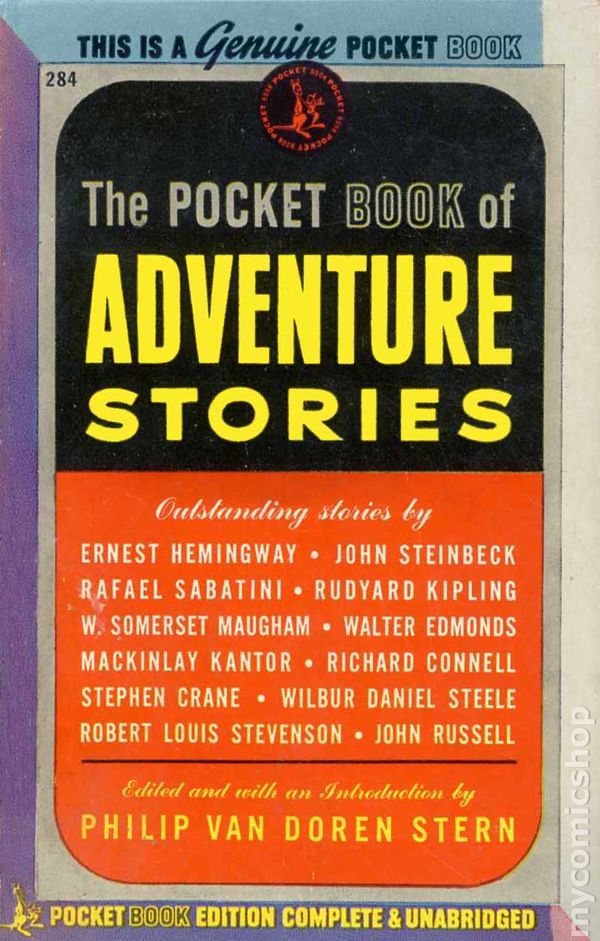Book Review: The Pocket Book of Adventure Stories edited by Philip Van Doren Stern
In his introduction, the editor talks about the thrill of adventure stories, how often they are churned out as cheap entertainment, and that he has selected twelve really good ones for the reader. This 1945 book was designed to be easily shipped overseas to soldiers, after one finished it oneself. I like to think it’s known many readers.

“Fifty Grand” by Ernest Hemingway starts us off with the tale of a boxer at the end of his career. Jack just hasn’t got it any more; he’s training hard, but he’s going to lose this fight and he knows it. He’s bet $50,000 on the other fellow to win, but Jack has to make it look like he’s not throwing the match. Even by boxing standards, this fight will be brutal. Short, punchy dialogue, lovingly described boxing.
“Flight” by John Steinbeck begins close to his beloved Monterey, but unlucky farmer and knife handler Pepe Torres must soon flee as he has killed a man for the honor of a woman. Up into the hills he goes, but can he escape his fate?
“Red” by W. Somerset Maugham has a ship captain visiting a strange white man’s bungalow in the South Seas. The settler tells the skipper of the first white man to live in that spot, and his tragic love. Both men have hidden motivations, and the ending is bitter. This story stretches the definition of “adventure” considerably.
“Gun Crazy” by MacKinlay Kantor is about Nelson “Nelly” Tare, a boy and then man who’s crazy about guns. He loves collecting guns, and loves shooting them. He’s very good at shooting. But eventually he starts using guns for crime, and his boyhood friend the sheriff has to confront him with a dark secret. I’ve reviewed this one before.
“Escape from the Mine” by Walter D. Edmonds is a bit of a rarity. The protagonist, John Wolff, is in a rebel prison in 1776 for feeding Loyalist refugees. It’s an inhumane prison fashioned from an exhausted mine, and seems escapeproof. But John Wolff is worried about his wife, and just maybe he can pull it off.
“The Most Dangerous Game” by Richard Connell perhaps should be called “The Most Anthologized Story.” Here again is the classic tale of a man trapped on an island with General Zaroff, a big game hunter who wants to hunt men. It’s still a classic.
“The Fourth Man” by John Russell has four men on a raft, three of whom are escapees from the French prison at New Caledonia. The fourth is a native who’s been contracted to get them to an escape ship. When the ship is delayed, nerves begin to fray, and the water supply slowly dwindles. The three white men, confident in their superiority, turn on each other. The fourth man never speaks, only moves the raft. How is he not dying of thirst? I started skimming to get to the twist ending.
“The Man Who Saw Through Heaven” by Wilbur Daniel Steele has a man about to go be a missionary in Africa when an astronomer introduces him to the concept of infinity and what that really means. His mind snaps. We follow a fellow from the missionary society who’s been asked to find him by the missionary’s wife. They follow the trail of tentacled monstrosities he’s been sculpting across the Dark Continent. Much of the story reads like Lovecraftian cosmic horror…and then there’s that ending. Quite good.
“The Open Boat” by Stephen Crane is also about four men trapped in a tiny vessel on a hostile sea. But it’s much more about pulling together for survival than falling apart. Reviewed before.
“The Man Who Would Be KIng” by Rudyard Kipling is another much-anthologized piece that I’ve seen before. Two men go out to set themselves up as kings in a remote part of Afghanistan. It ends about as well as you’d expect. It’s a testament to Kipling’s writing skill that the lengthy prologue before we get to the meat of the story is also fascinating.
“The King’s Messenger” by Rafael Sabatini has a messenger come to Santiago de Porto Rico to deliver a knighthood to the local governor, and to arrange the ransom of his cousin Don Rodrigo from the infamous pirate, Captain Blood. The governor is very pleased at the first, and completely uninterested in the latter. The governor treats his wife, also Don Rodrigo’s cousin, very badly and dismisses her words without thinking. He will certainly regret that before this story is over! Swashbuckling stuff in the Zorro mode.
“The Sire de Maletroit’s Door” by Robert Louis Stevenson closes the volume with a young nobleman lost in an unfamiliar and hostile city. Fleeing a patrol, he finds a door that easily opens, but cannot be used to exit once inside. This turns out to be a trap set by Maletroit, a local nobleman of great pride, for the young man who’s been courting his niece. Denis is not that man, but Maletroit doesn’t really care. To stop scandal, his niece will be married at dawn, or Denis will be dead. The two young people are left to debate what they should do. Is there any third option?
Content note: Several of the stories have period ethnic and racial prejudice, including use of ethnic slurs. There’s some dubious consent in sexual relationships. The governor of Porto Rico is verbally abusive towards his wife, and is clearly only still married to her because Catholic.
Overall: Of the stories I hadn’t read before, the Steele and Sabatini stories were the ones I enjoyed most. The Russell one is about ten pages too long, and the Maugham is just sort of icky and not really adventure. You can probably find this anthology by combing better used bookstores, but might be better served finding the individual stories that sound good in newer anthologies.

